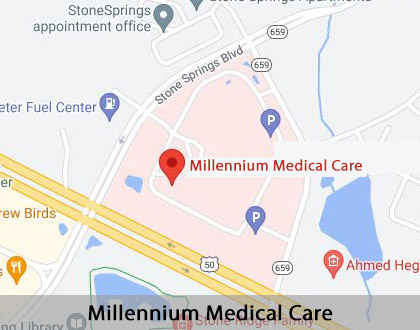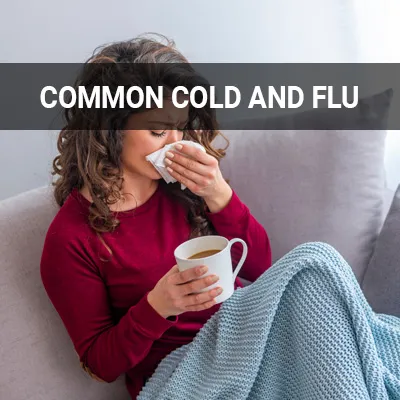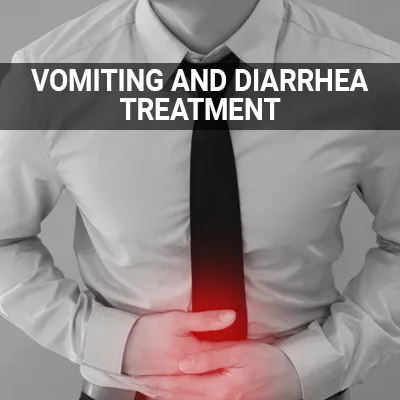Fever Treatment Sterling, VA
It can be concerning when a fever lasts for longer than expected or begins to spike without warning. In these instances, it is vital to seek proper treatment. An urgent care physician can reduce the risk of any long-term complications from fever, such as dehydration or the spreading of infection.
Fever treatment is available at Millennium Medical Care Stone Springs in Sterling and the surrounding area. It is especially crucial to seek treatment if a severe fever develops in a toddler or young child. Call us today at (703) 665-3242 to schedule an appointment or to learn more about our services.
Causes and Symptoms of a Fever
Understanding why fever occurs is essential to proper treatment. In some instances, the cause of fever is quite evident. For example, the patient may be suffering from a heat stroke or have recently received a vaccination. However, fevers can often occur seemingly out of nowhere and with little to no warning signs. In these instances, the cause is likely either a bacterial or viral infection. Common causes include:
- Bacterial infection
- Cancer
- Heat exhaustion
- Inflammatory conditions, such as arthritis
- Reaction to a medication
- Vaccinations/Immunizations
- Viral infection
It is also vital to understand how to recognize fevers. This can assist in early intervention and treatment. Fevers typically manifest themselves as a combination of chills, dehydration, headache, irritability, muscle aches, and sweating. Parents and caregivers should take extra note of these symptoms, as children and incapacitated individuals are often unable to express experiencing such symptoms verbally. Though a warm forehead is often a telltale sign of fever, it is not always the most reliable on its own.
Facts
- Fevers turn on the body’s immune system and are one of the body’s protective mechanisms.
- Only body temperatures over 108°F (42°C) can cause brain damage. The body temperature can only go this high with extreme environmental temperatures.
- Fevers from infection usually top out at 103°F to 104°F.
- With treatment, fevers usually come down 2° or 3°F.
- Temperatures between 98.7°F and 100°F (37.1°C to 37.8°C) are considered low-grade fevers.
- If the fever is high, the cause may or may not be serious. If your child looks very sick, the reason is more likely to be dangerous.
- Viruses or bacteria may cause fevers that don’t respond to medicine.
Questions to Ask Your Urgent Care Provider
- What should I do if my fever does not improve within the next couple of days?
- What is the leading cause of my fever? Is there something I could have done to prevent it?
- What can I do to ensure I do not get another fever?
- How long does it take to reduce a fever with treatment?
- Can I still go to work or school while I have a fever?
- What over-the-counter medication can I take to help reduce my fever?
- My fever keeps me from sleeping at night. What can I do to sleep better while I have a high temperature?
- Is there anything I can do other than rest and stay hydrated to help the fever go away?
- What can I do to help speed up the recovery process?
- When should I call you about my child’s fever if the treatment does not appear to be working?
- Is my fever contagious? What should I do to ensure those around me do not get sick?
- Are my child’s or my symptoms normal? How many cases of fever have you treated in the past?
- What treatment options are available to me?
“Understanding why fever occurs is essential to proper treatment.”
Fever Treatment Options
To properly treat a fever, an urgent care physician may need to question the patient about their medical history and symptoms. They will also perform a physical examination, take the patient's temperature, and sometimes even order tests to determine the cause of infection. The physician will then make a medical diagnosis and begin creating a treatment plan that best fits the patient's needs.
Medication, both over-the-counter and prescription, is the most common form of fever treatment. Popular over-the-counter fever reducers include acetaminophen and ibuprofen. Patients with fever caused by bacterial infections may also be prescribed antibiotics for their condition. Similarly, those with fevers caused by viral infections may be prescribed antivirals for their condition. Some home remedies may also help reduce fever, regardless of its cause; these involve getting a proper amount of rest, staying hydrated, and wearing light clothing.
“Medication, both over-the-counter and prescription, is the most common form of fever treatment.”
How to Prevent a Fever
The conditions that cause fever can sometimes be unpredictable and happen for no particular reason. Still, there are certain precautions patients can take to minimize the risk of developing an infection. These involve practicing proper hygiene, maintaining a safe distance from those who may be sick, getting enough rest, and staying hydrated.
Infections are passed on through germs. Thus, it is crucial to reduce exposure to germs whenever possible. Patients can do this by washing their hands several times a day, sneezing into their elbows instead of their hands, and avoiding touching the face. Distancing oneself from sick individuals until their symptoms pass is also crucial to prevent transmission.
“…it is crucial to reduce exposure to germs whenever possible.”
Check out what others are saying about our services on Yelp: Fever Treatment in Sterling, VA
Questions Answered on This Page
People Also Ask
Q. What are food poisoning symptoms?
Q. What are the signs of common cold and flu?
Frequently Asked Questions
Q. My doctor would not give me antibiotics to treat my fever. Why would he not allow antibiotic treatment?
A. Antibiotics are only effective against bacterial infections. Viral infections are best treated with antivirals or other medications. Over-the-counter medicines and home remedies are typically sufficient to reduce fevers that are not caused by bacterial or viral illnesses. If your symptoms do not lessen, however, call our clinic immediately.
Q. Why do fevers occur? Do they serve a purpose?
A. Fevers are essential to our recovery from an infection. Certain parts of the immune system work best at higher temperatures. However, a temperature that rises too quickly can suggest that something else is wrong.
Q. When is it okay to treat a fever at home? When do I need to go to urgent care?
A. Most fevers can be treated at home and can be managed with over-the-counter medication, rest, and proper hydration. However, a fever that becomes intolerable or rises above 102 degrees Fahrenheit should be treated at urgent care to avoid any complications. It is also essential to seek medical assistance whenever a young child or toddler suffers a severe fever. By addressing the underlying condition, you can keep the fever at a tolerable level.
Q. What is considered a "normal" fever?
A. A normal fever that does not call for immediate medical attention is typically a fever under 102 degrees Fahrenheit. However, any fever that causes severe discomfort and excessive symptoms should be treated at an urgent care facility.
Q. It seems like I have several fevers each year. How often is too often to experience a fever?
A. Suppose you are experiencing fevers without falling ill with a viral or bacterial infection, suffering from heat exhaustion, or any other well-documented cause. In that case, chronic fevers may be a cause for concern, and you should seek out medical attention immediately. Fevers due to known reasons, however, should not be alarming.
Start Feeling Better – Visit Us Today
By visiting us as soon as possible, our team can help get you the professional treatment you need. Instead of waiting around and allowing the symptoms to get worse, we can provide you with stronger medication and treatment options instead of ineffective store-bought products.
Definitions
Come In Today
If you or your child are experiencing a fever over 102 degrees, it is crucial to seek immediate medical attention. We at Millennium Medical Care Stone Springs may be able to help. Call us today at 703-665-3242 to schedule an appointment or to learn more about our services. We also accept walk-ins.
Helpful Related Links
- American Journal of Medicine. American Journal of Medicine. 2023
- American Medical Association (AMA). American Medical Association (AMA). 2023
- American Medical Society For Sports Medicine (AMSSM). American Medical Society For Sports Medicine. 2023
- American Trauma Society. American Trauma Society. 2023
- John Hopkins Medicine Orthopaedic Surgery. John Hopkins Medicine Orthopaedic Surgery. 2023
- National Council on Aging. National Council on Aging. 2023
- Orthopaedic Surgery: Association of American Medical Colleges. Orthopaedic Surgery: Association of American Medical Colleges. 2023
- Radiological Society of North America. Radiological Society of North America. 2023
About our business and website security
- Millennium Medical Care Stone Springs was established in 2023.
- We accept the following payment methods: American Express, Cash, Discover, MasterCard, and Visa
- We serve patients from the following counties: Loudoun County
- We serve patients from the following cities: South Riding, Brambleton, Sterling, Ashburn, and Aldie
- National Provider Identifier Database (1427061381). View NPI Registry Information
- Healthgrades. View Background Information and Reviews
- Norton Safe Web. View Details
- Trend Micro Site Safety Center. View Details
Back to top of Fever Treatment










